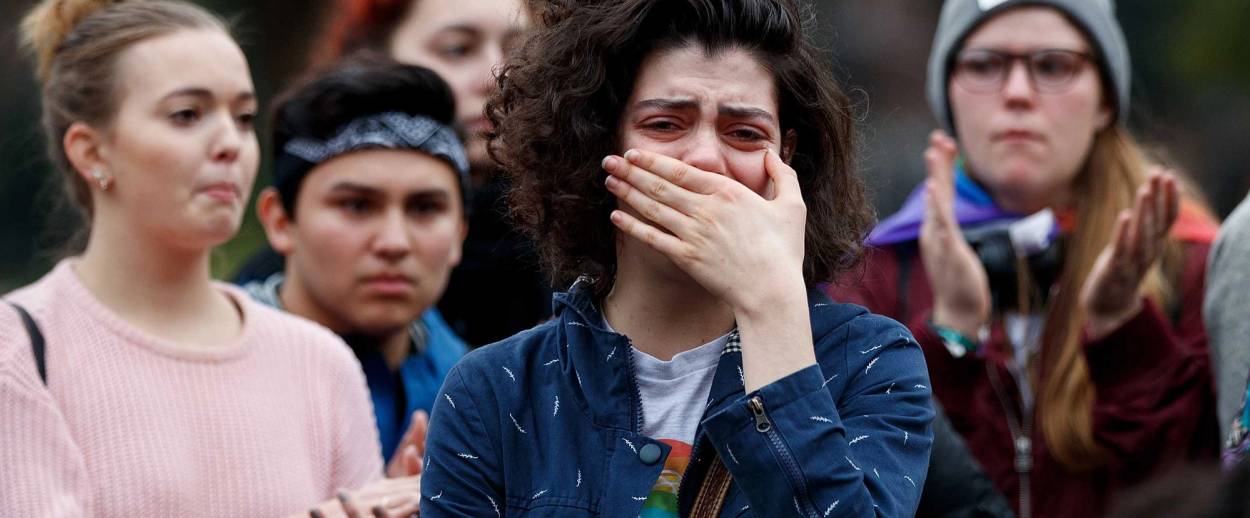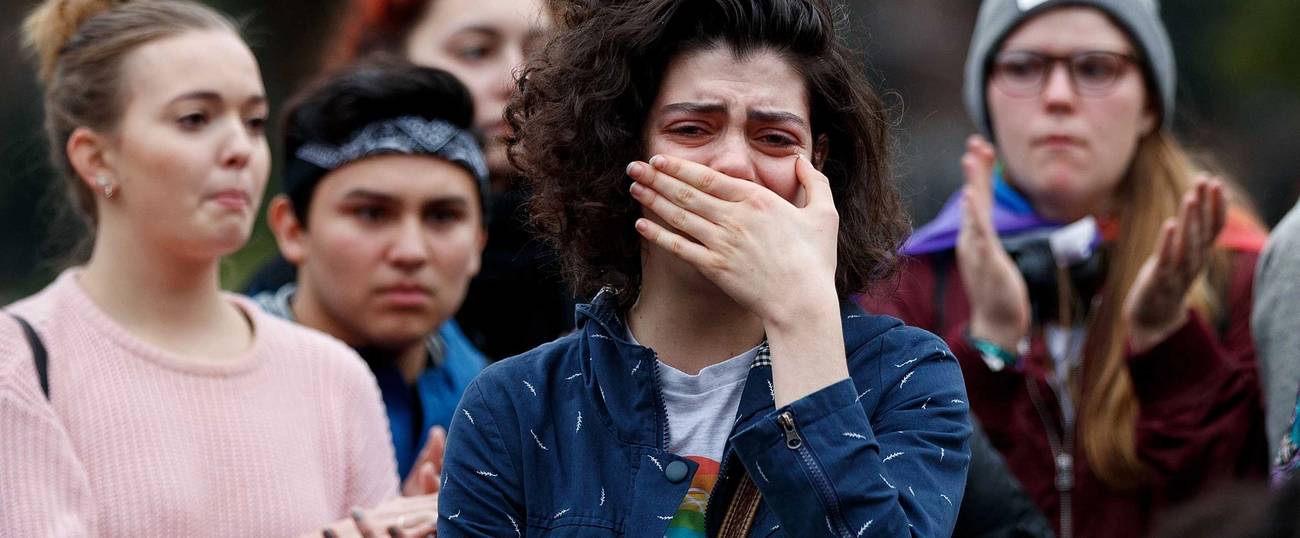The View From Tel Aviv
Israeli leftists are no strangers to sudden electoral defeats. Is there anything American liberals can learn from them?




For anyone who has studied the operatic stumblings of the Israeli left—a two-decade pratfall punctuated by short stabs of hope and long dives into agony—the surprise election of Donald J. Trump may feel like déjà vu. But are there lessons for American liberals in the Israeli left’s sorrows? Should Nancy Pelosi look to Buji Herzog for advice? And what might those enraged by Bibi teach those across the sea who now despair at Donald? Lahav Harkov, The Jerusalem Post’s Knesset reporter, and Amir Tibon, the diplomatic correspondent for the Israeli news website Walla, graciously agreed to sit down with Tablet’s Liel Leibovitz for a spirited exchange.
Liel Leibovitz: Earlier this month, after the upset election of Donald Trump, American liberals went through something that resembled the stages of grief: first denial, then rage, and, finally, a kind of grudging acceptance. Having observed the Israeli left—itself the subject of such numerous last-minute defeats in recent decades—did you recognize their response? Or did Trump register on a whole different scale?

Lahav Harkov: There are definitely parallels between the reaction of the left in Israel to Netanyahu’s 2015 victory, which was yuuuuge, as Trump would say, and the American left to Trump’s victory this month. In both cases, a group that often lectures others on democratic values showed an unwillingness to accept the outcome of a democratic election. The #NotMyPresident phenomenon was already done in Israel over a year-and-a-half earlier. I think, though, that there is a distinction to be made between the two responses, in that Trump and Netanyahu are very different. While Netanyahu uses populist messages sometimes, there really is no one in the Knesset these days who is as experienced or as qualified as he is. Netanyahu has also had a consistent ideology over decades; he’s veered from it in some ways, but I think mostly within the reasonable framework of learning and reanalyzing things over time. Trump, on the other hand, has suggested many unconstitutional ideas and has very little by way of a consistent platform and no experience, riding mostly on populism.

Amir Tibon: All of this feels awfully familiar. I was in the U.S. in the days before the election, traveling through swing states, talking to people, and trying to make sense of what they were saying. And with every passing day, my frightening gut feeling that Trump was going to pull it off got stronger, because what I heard from people mirrored in so many ways the last days of Israel’s 2015 election. The very last polls going into Election Day missed a last-minute movement from other right-wing parties to Netanyahu’s Likud, which is why the pollsters accurately predicted the Knesset-seat breakdown among the center-left bloc, but failed miserably to forecast the results within the Israeli right, and with it, Netanyahu’s victory.
The days after the election were also very similar, with that whole cycle of grief just exploding endlessly on my Twitter feed. But I do think there was one important difference. Among Israeli leftists, the 2015 defeat—much more than previous ones—created a sense of “the end of the road.” People started talking about how the demographic trends make any future victory for the left totally impossible, and that it’s time to come to terms with our loss, not in the sense of losing the election but more in the sense of losing the country. I haven’t heard a lot of that from American leftist friends, who seem to see a silver-lining in Clinton’s popular-vote margin and in the assumption that younger Americans are more liberal, so time is basically on their side. It seems like while many in the Israeli left have already given up, in America there are more liberals who still have a fight in them.
Both of you allude to a sort of person we all know well, our lofty lefty friends who decry Bibi as an undemocratic monster while sipping lattes in Tel Aviv cafes and doing not much else of any use or merit. So, let’s be blunt here: What should American liberals not do now that they’ve been stunned?

Don’t fall into each and every one of Trump’s little traps—like the one he set the other day with the flag burning.
If you’re up for a fight, focus on what matters to his “soft” voters who are persuadable, not on what drives the Twitter conversation of the day.

I don’t think that accusing the half of the country that voted for Trump of racism or sexism or destroying America is in any way constructive. Chances are, American liberals know and even like someone who voted for Trump. Think about that person. And think about whether telling that person she or he is a horrible person will change his or her mind. You’re thinking it’ll just annoy him or her, right? So now, multiply that by millions. That attitude just isn’t constructive. And even if you’re not making accusations against people per se, this attitude of mourning isn’t going to help anything, either. It just comes off as childish. At least try to make well-reasoned arguments. Even if they’re angry, I think they’re more effective in getting people to listen than crying.
OK. How, then, should the fight continue? The Democratic Party now faces questions and conundrums the Israeli Labor Party—and, to a lesser extent, other central-left parties—had to face in recent years. Put crudely, the dilemma that played out in the aftermath of an electoral collapse is whether the party should go further left and adhere to a purer version of its liberal vision or whether it should veer more to the center and create a broader coalition. What can the Democrats learn from the foibles of Shelly Yachimovich, Buji, et. al.?

It’s hard to give the Democrats advice based on what Labor, now known as the Zionist Union, has done, because not much seems to work for them. They’re not polling very well these days, and they haven’t had a prime minister in office since Ehud Barak in 2001. But they did well in the last election, even if they lost by six seats, and I think part of it was the alliance with Tzipi Livni’s party that allowed them to become a sort of consolidated leader of the center-left bloc, which is often diffuse with a lot of parties. That’s something that won’t help the Democrats, because they’re already one party. A piece of advice that I think would work well for both Labor and the Democrats, then, is to run with a candidate with a solid military or other strong security background. Both Netanyahu and Trump ran as tough-guy candidates and played on people’s fears, and it worked. As much as people on the far left like to call Clinton a “neocon,” I’m not sure that undecided voters saw her as a hawk.

The Labor Party in Israel has tried both moving to the center and moving to the left following its five electoral losses since 2001. Neither worked, but in the last elections, the move toward the center turned an election that was supposed to be a cakewalk for Bibi into a surprisingly competitive race. It was certainly the first election since Ehud Barak’s victory in 1999 that anyone thought Labor actually had a chance, and it happened with a party leader, Herzog, who isn’t the most charismatic politician in the country. But does that lesson apply for the American left as well? I’m not sure. Maybe the real lesson is less about the policy proposals and more about the qualities of the candidate and the kind of campaign you run.
Let’s talk about running campaigns, then, which necessarily means talking about voters and their feelings. Regardless of the strategy they take to win back power, the left in America now has to deal with a challenge the left in Israel has been facing for a while, namely the sneaking suspicion that too many voters simply reject its core values. Could it be that there is simply some fundamental disconnect between the values of classical liberalism and the increasingly nationalistic, religious, xenophobic tide sweeping so many across the world?

Living in Tel Aviv, I’ve had recent experiences relating to both Israeli and American politics that show that exact phenomenon. On the Shabbat after Trump was elected, I went to an egalitarian minyan run by some friends in Tel Aviv, and at the end, one of the participants, an immigrant from the United States like myself, got up and said we should all say the prayer for the United States, because she’s afraid for America, and she started bawling as she said it. I have no problem with saying the prayer, but the reasoning, and the public crying—she was joined by others—made me very uncomfortable. Then, this Shabbat, I was talking to someone at my synagogue who told me she voted Meretz, and she went on and on wondering how Netanyahu is still prime minister, what appeal does he have anyway, and what kind of person would ever vote for him. And then she said people must just vote for him because their parents voted for Menachem Begin, and it’s a tribal feeling. I was baffled by how an intelligent person can dismiss the whole idea of being right-wing as stupid, and not even try to engage with it. All this approach does is create more polarization and will hinder the left’s chances of bringing in new voters. I’m not saying people should pander to those with illiberal ideas, but there is a very large space between pandering and what is happening now.

This political “tactic” of blaming and bashing the voters is the single stupidest thing that [some] Israeli leftists have developed over the years, and God help us if American leftists are now adopting it. Calling people stupid, racist, and hateful isn’t a good way to convince them to change their opinion on anything, but it’s a great way to discredit yourself in their eyes for eternity. I think people who say these kinds of things about “anyone who voted for Trump” need to remember that there are many, many Hillary Clinton voters who have family members and friends who voted for Donald Trump, so when you use that kind of language, you’re not just insulting “the other side,” you’re actually insulting people who are dear to many on “your side” as well. Which is a great tactic if your aim is to lose the next election by a larger margin. There are many people who voted for Trump despite his racism, not because of it, but if you accuse them of being racists, you’re pushing them into the hands of the actual racists out there. That’s a dangerous game to play.
Let’s entertain a wild proposition for a moment. All the differences aside—between Bibi and Trump, between Labor and Democrats, between Israel and America—could it be that what we’re seeing here isn’t necessarily about left versus right but about one style of politics versus another? Many of Trump’s voters, after all, previously voted for Obama, and Israeli prime ministers, too—Barak, Sharon, Olmert, even Bibi—shift around quite a bit from left to right, depending on the circumstances. Could it be that we’re seeing something more profound? A rejection of staid and stable and reasonable institutions of government and a search for something that feels like radical change, even if the change is wild and precarious? Could Israel soon have its Trump, too?

There seems to be a rise of political populism in the Western world in general. I’m not sure Bibi is emblematic of that, even if he uses populist messages sometimes— he’s just trying to ride it out and stay in office. But there are others in the Israeli political scene today that are examples of that trend. The most obvious is Culture Minister Miri Regev of the Likud, who’s wildly popular. Another is Likud MK Oren Hazan; it seems like every scandal in which he finds himself embroiled only makes him politically stronger, much like Trump. Both of them say that they admire Trump. A less obvious example of an Israeli Trump-like figure is Yair Lapid, who’s polling quite well these days. Granted, Lapid’s style is totally different. He has adopted the trappings of a typical politician; he is not crude, and his political positions are not similar to Trump’s. Don’t forget, though, that most Israelis knew him as a talk-show host before he entered politics. His party is inherently populist, even if it’s not extremist the way most of the rising populist groups in the world are these days, and some of his positions are pretty pliable. He also appeals to a certain insularity in Israeli Jewish society in that he consistently tries to send the message that he is the authentic representative of the average Israeli, of “us,” even though he’s wealthy and Israeli media royalty living in a posh north Tel Aviv neighborhood.

We could endlessly discuss all the possible candidates—from Miri Regev to Lapid to Lieberman—but if it’s a real Trump, it will probably be someone who is famous and a regular television favorite but is currently outside of the political system and isn’t even being considered as a possible contender.
Speaking of the media, in America, like in Israel, the press got the political pulse of the country dead wrong. Have Israeli journalists done anything to mend their ways after Bibi’s victory? Should the American press take note?

The short answer? No and no. The longer answer is that it seems like some American journalists are undergoing more of a reckoning than Israeli journalists did on the whole. I’ve seen some major outlets talk about the need to get out of major metropolitan centers and get to know more of America. Israeli political journalists could learn from that.

The media around the world has become too heavily concentrated in a small number of big cities (Tel Aviv, London, New York, Washington) and has very little patience or appetite for what’s going on outside of those places. I have no right to pass judgment on this issue because I myself am about to (very sadly) leave the kibbutz in southern Israel where I’ve lived for the last two years and move to one of those cities as well. But this is a huge problem that has to be addressed. I think many media outlets today cover parts of their own countries as if they’re covering a foreign land. And there are huge areas of democratic countries where out of thousands of residents, maybe five personally know a journalist. That’s disastrous if you believe like I do that trust in the media is vital for a healthy democracy.
A separate but just as critical problem is the terrible fixation on polling during election coverage. If every minute the media spent discussing polls during the elections had been used instead to discuss real issues that affect people’s lives, it would have been so much better for everyone involved. Israel has a law that forbids the publication of new polls in the 48 hours before the election. Maybe it’s worth considering applying that law over a longer period of time (a week? a month?) and force the media to actually, you know, cover the issues at the heart of the election.
I want to end on a personal note and ask how you, as individuals, deal with life in a situation that so often feels, to so many, politically, ideologically, and cosmically hopeless. Any personal, emotional strategies for reflection, transcendence, and inspiration?

I’m a journalist, so I don’t have the privilege of shutting out the bad news, but here’s one piece of advice: It’s a bad idea to sit in front of the TV and wait for the media, or the police, or the court system, or some other institution of power, to end Bibi or Trump’s rule. It may happen, of course—Bibi could turn into a second Ehud Olmert, and Trump into a second Nixon—but it’s more likely that they both will survive all their scandals, and will keep going, until they are defeated at the ballot box. But, you ask, is it even possible to beat them there? I don’t know, but the most optimistic people I talk to these days are the ones working to make it happen. So, better to devote time to that, not to sitting and fretting in front of your TV or Twitter feed.

As you may have figured out by my other answers, I don’t really feel like things are hopeless. America and Israel are great countries and great societies and I’m pretty confident that they can get over any bumps in the road. The moment that I feel like my anger is disrupting my life is the moment I try to step back and focus on the good, whether it’s what’s good in my life specifically, or what’s good in the country. The other thing that I think is helpful with political despair and frustration is volunteer work and charity. Try to think of who is being impacted by these policies, and how you can help them. I liked that after Trump was elected, some people responded by looking for charities that help refugees, and I thought it was beautiful how all parts of Israeli society, whether secular or religious, Jewish or Arab, made efforts to host people who were evacuated from their homes in the recent fires in Israel. I think that’s a more effective coping strategy than just letting off steam or arguing on Facebook.
***
Like this article? Sign up for our Daily Digest to get Tablet Magazine’s new content in your inbox each morning.
Liel Leibovitz is editor-at-large for Tablet Magazine and a host of its weekly culture podcast Unorthodox and daily Talmud podcast Take One. He is the editor of Zionism: The Tablet Guide.